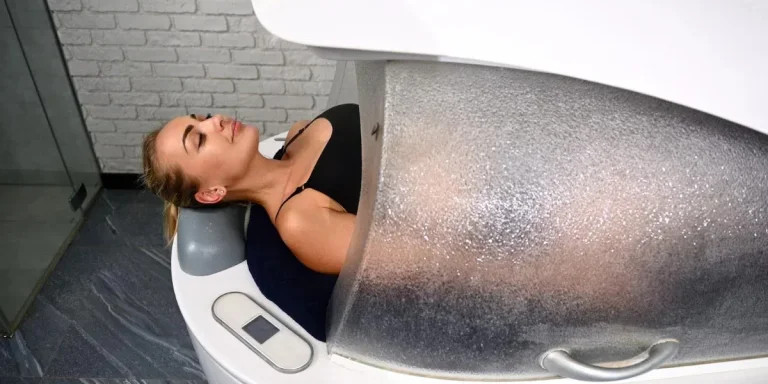Hyperbaric oxygen therapy (HBOT) has been around for a while, helping people treat various conditions including pressure wounds and decompression sickness. However, this therapy has now caught the attention of professional athletes as well.
Athletes use HBOT to quicken joint pain, concussion, and torn muscle/tendon recovery. The best part? They don’t have to go to spas or aestheticians to get this treatment. Athletes (and other customers) can get HBOT therapy from the comfort of their own homes with a portable hyperbaric oxygen chamber.
This article will explore everything you need to know about portable hyperbaric oxygen chambers, including how to select the best options to sell in 2025.
Table of Contents
A summary of the hyperbaric oxygen therapy device market
Hyperbaric chambers: What are they, and what can they do?
Types of hyperbaric oxygen chambers
What to consider when choosing a home hyperbaric oxygen chamber
The bottom line
A summary of the hyperbaric oxygen therapy device market
The global HBOT device market reached a US$ 3.5 billion value in 2023. Experts say the market will grow to US$ 4.9 billion by 2030 at a 4.9% compound annual growth rate (CAGR). The increasing acceptance of this technology worldwide is one of the primary factors driving this market’s growth. Additionally, the development of portable HBOT devices is also boosting market demand.
Here are other stats to note about the hyperbaric oxygen therapy device market:
- Multiplace HBOT devices registered the most sales in 2022 thanks to their high adoption rate and commercial availability.
- North America is also the leading region with a large 31.3% revenue share. The U.S. is the region’s highest contributor due to its high disposable income.
- According to Google data, current searches for hyperbaric oxygen chambers are the same as in 2023. They ended 2023 with 9,900 searches and attracted the same value in July and August 2024. However, searches peaked at 18,100 searches in February and 14,800 in May 2024.
Hyperbaric chambers: What are they, and what can they do?
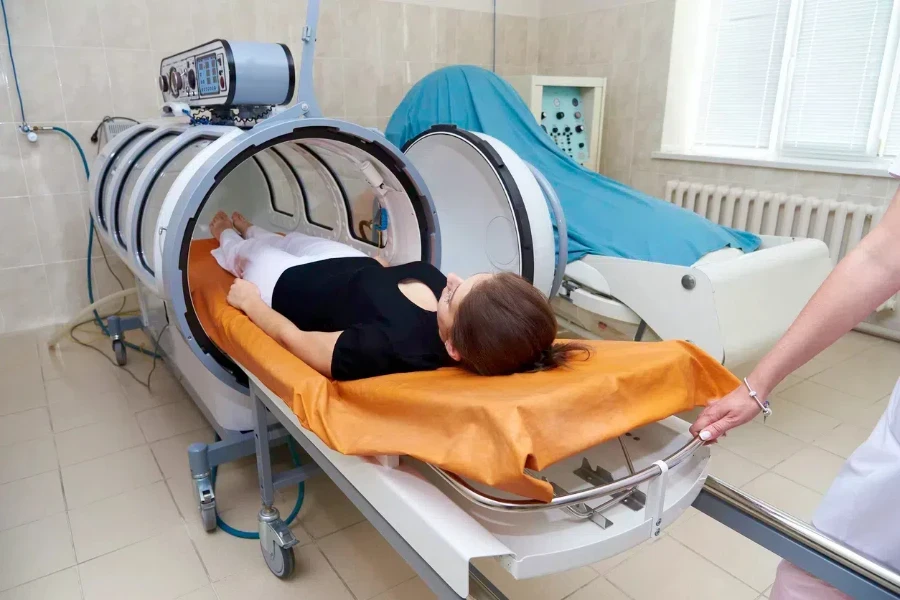
Hyperbaric chambers are a key part of HBOT treatments. They help increase the amount of oxygen the blood vessels and tissue dissolve (including poorly vascularized areas). As a result, users can oxygenate their damaged tissues or stop the spread of bacteria that only become serious in oxygen-deficient environments. Sometimes, these chambers use compressed air instead of pure oxygen to reduce the chances of flame-based accidents.
What can a hyperbaric chamber do?
Consumers can enjoy several therapeutic benefits from a hyperbaric chamber. Here’s a look at some of them.
Treating gas embolism/decompression sickness
Decompression sickness is one of a diver’s worst fears. It happens when they surface too fast after staying underwater for too long. Although they can do decompression stops on the way up, those who don’t can use a hyperbaric chamber to treat their decompression sickness effectively.
Beyond divers, decompression sickness can also affect people working in compressed air tanks, astronauts after a spacewalk, and airmen with altitude sickness.
Treating skin injuries and burns
Sometimes, wounds or burns won’t heal quickly, causing gangrene. However, hyperbaric chambers can provide relief for these consumers, especially those with severe burns. Additionally, those with bedsores, Buerger’s disease, and diabetics with wounds can treat their medical conditions with these chambers.
Post-radiotherapy treatment
It’s not uncommon for consumers to suffer complications (like late radiation-induced tissue damage) after using radiotherapy for cancer treatment. Thankfully, HBOT therapy can improve oxygen supply to damaged tissue and stop severe damage, like necrosis.
Treating carbon monoxide poisoning
If consumers have severe carbon monoxide poisoning, they suffer later neurological sequelae after passing out. The following symptoms would be memory problems, mood changes, and personality disorders. Thankfully, hyperbaric chamber treatments effectively lower the risk of late effects.
Types of hyperbaric oxygen chambers
1. Soft or portable hyperbaric chambers
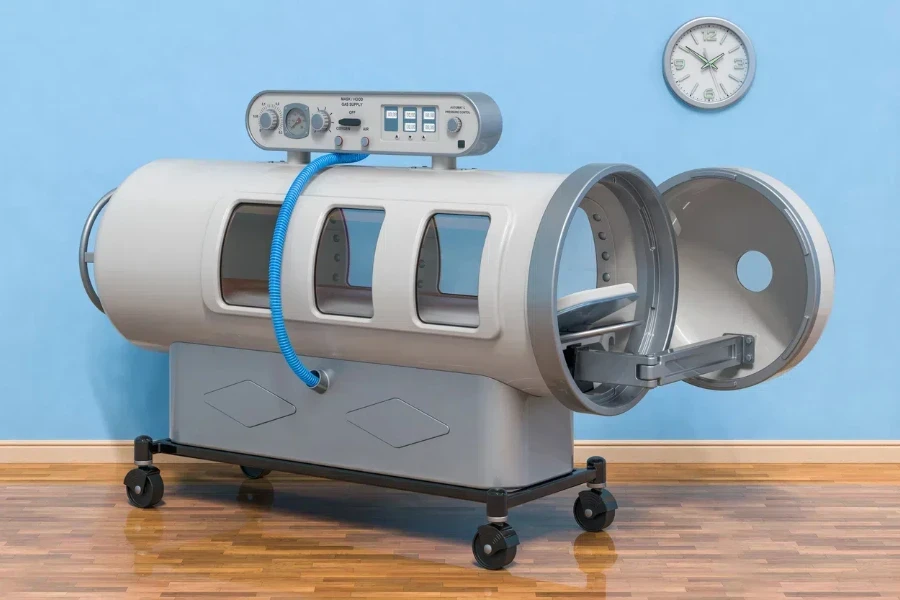
Soft hyperbaric chambers (or mild HBOT, portable, or inflatable chambers) are portable designs that close with a zipper. They are the most popular option for homes and can deliver 24% oxygen for therapy sessions. Soft hyperbaric chambers are also popular in gyms, chiropractors, wellness centers, spas, and senior living communities.
These hyperbaric chambers are portable and easy to set up and they are also user-friendly, meaning anyone can use them. Plus, they are pretty affordable, making them a great option for startup businesses.
However, business buyers must understand that these medical devices offer lower air pressure compared to their hard counterparts. Also, it’s important for buyers to know that mHBOT (Mild Hyperbaric Oxygen Therapy) may not be able to treat more severe cases, even though it’s ideal for personal use.
2. Hard hyperbaric chambers
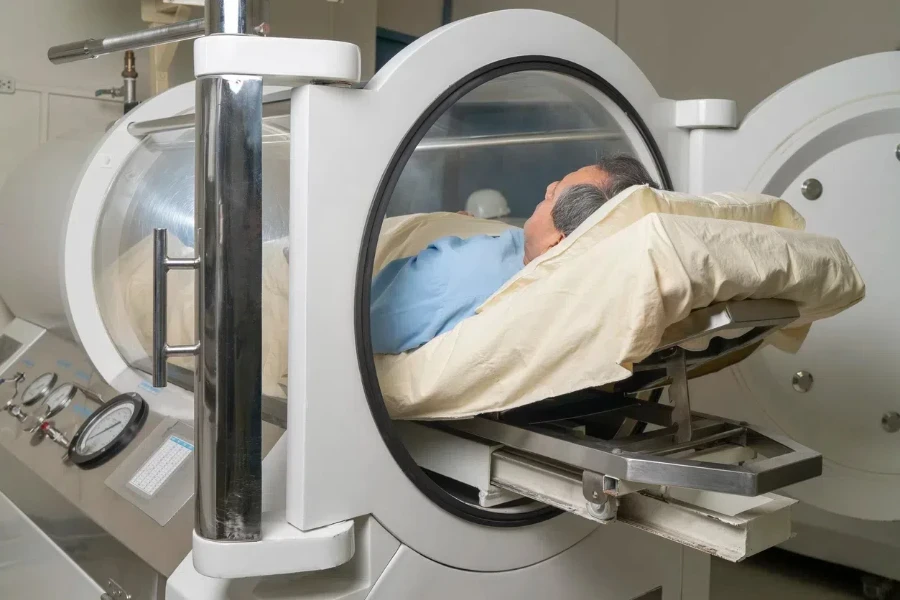
Hard hyperbaric chambers are the go-to for higher HBOT therapy pressures. Although consumers can use them at home, they are way too expensive for the average user. Instead, hard hyperbaric chambers are more common in hospitals.
Hard hyperbaric chambers can quickly increase blood oxygen levels. They are also the go-to for cell rejuvenation and tissue healing. What’s more, hard hyperbaric chambers offer the highest pressure levels for maximum oxygenation, which makes them better than soft or portable hyperbaric chambers for this.
But, businesses must understand that these chambers can be expensive for home use. Also, they are quite bulky, so they require a big space to fit in suitably. DIY installation is almost impossible with the hard hyperbaric chambers. Consumers may have to get professional assembly services if they choose to buy a hard hyperbaric chamber.
What to consider when choosing a home hyperbaric oxygen chamber
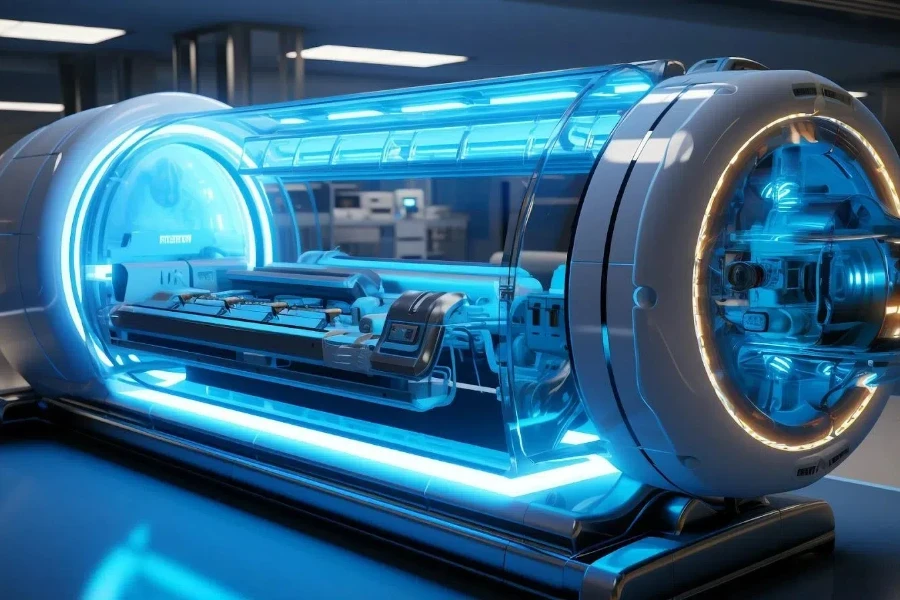
1. Orientation
The two types of hyperbaric chambers come in horizontal or vertical orientations. Here’s a closer look at each one.
Horizontal hyperbaric chamber
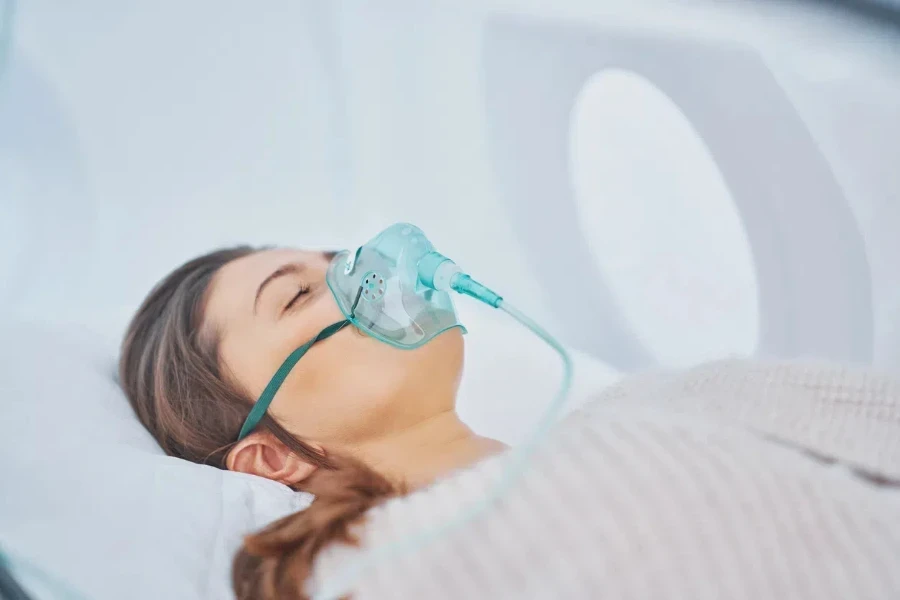
These hyperbaric chambers require users to lie flat for their HBOT therapy. Usually, they will cover their nose and mouth with an oxygen mask. Many prefer this position because it’s comfortable enough to rest, nap, or enjoy a relaxing therapy experience.
The best part is that most users get to enjoy a more comfortable supine position with these chambers. Plus,it’s the ideal go-to for users who love lying down during treatment.
However, horizontal hyperbaric chambers can be uncomfortable for consumers who don’t like enclosed spaces.
Vertical hyperbaric chamber
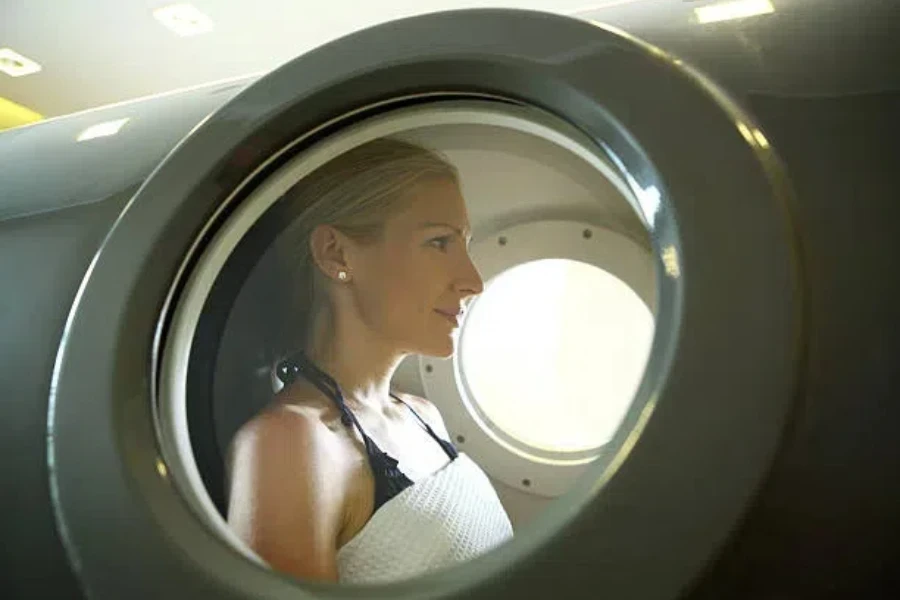
If consumers don’t like tight spaces, they will choose vertical hyperbaric chambers instead. This orientation also attracts consumers who prefer to remain active during treatment. The best part about vertical hyperbaric chambers is that consumers can use them while seated. Hence, they can read or use small electronics while receiving their therapy.
Also, vertical hyperbaric chambers are accessible for wheelchair users and they are usually more portable than horizontal hyperbaric chambers. The only issue is that users may have to sit up for more than 2 hours, which could be uncomfortable for some users who would love a quick nap during the treatment process.
2. Mono- vs. multi-place chambers (number of users)
Hyperbaric oxygen chambers can also host different numbers of users. Hence, retailers can either stock mono- or multi-place models.
Mono-place hyperbaric chamber
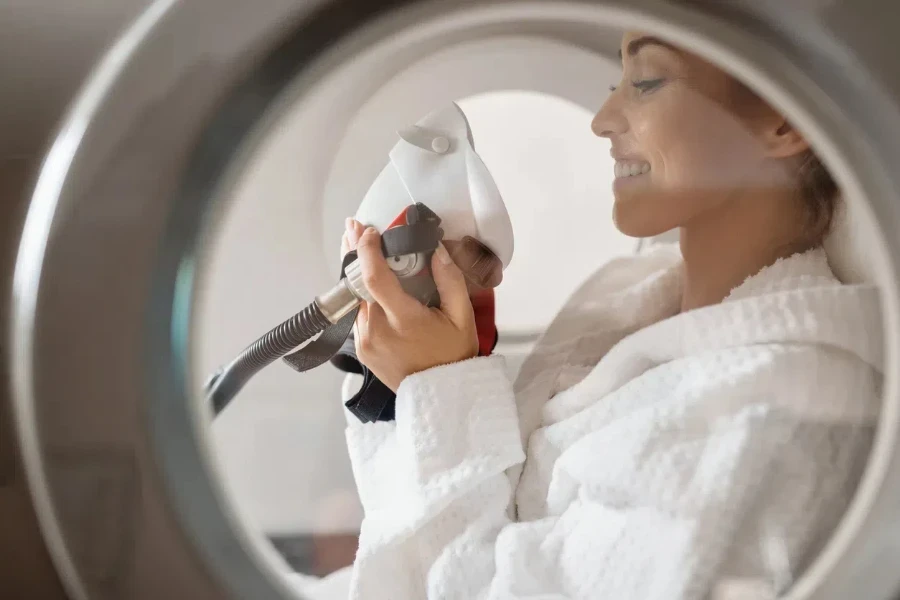
As their name implies, these hyperbaric chambers can only treat one user at a time. Mono-place versions are ideal for personalized treatment sessions, especially when users want them customized to their needs.
Mono-place chambers are ideal for businesses that are new to the industry because of their affordability. Also, they are more portable and can fit into a relatively smaller space. So, businesses don’t have to worry about breaking the bank to get a space while using them. But, their limited space may trigger people with claustrophobia.
Multiplace hyperbaric chamber
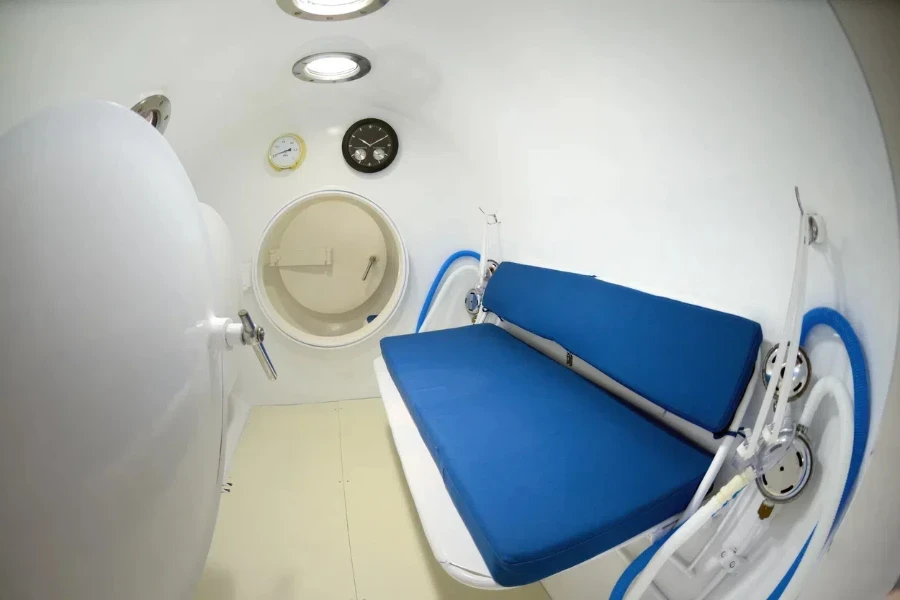
Unlike mono-place designs, these hyperbaric chambers can simultaneously treat more than one user. Multiplace hyperbaric chambers are also great for individuals needing assistance or who prefer maximum comfort during treatment. Hence, these hyperbaric chambers offer a less claustrophobic environment. Plus, treatment is more cost-effective when they are multiple users.
In fact, caregivers can also assist their patients with a multiplace hyperbaric chamber. Also, these patients can even get extra medical equipment in this larger chamber.
The only issue is multiplace hyperbaric chambers are more expensive than single-user options. Plus, they are typically hard-sided, meaning they are not very portable.
3. Chamber size
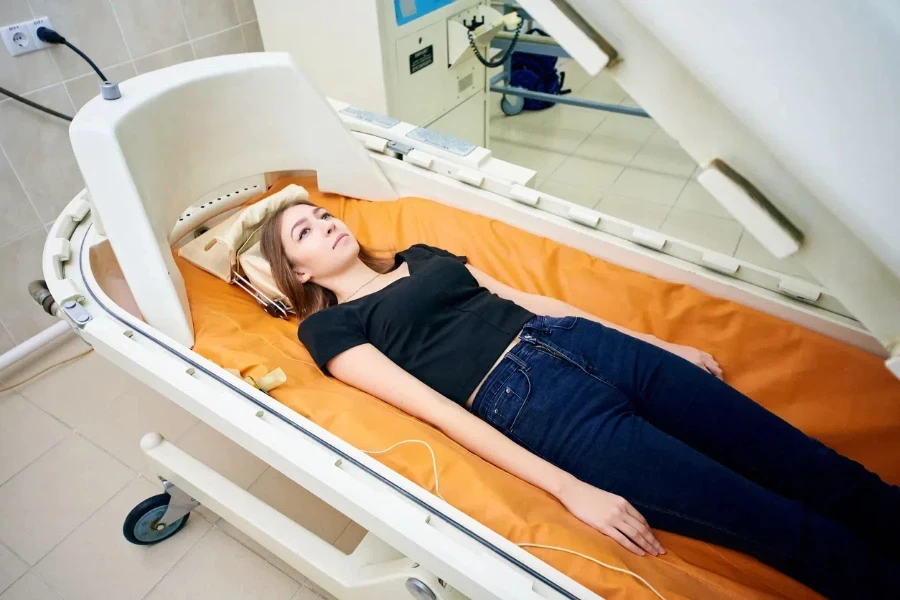
Another thing to consider when stocking a portable hyperbaric oxygen chamber is size. Consider whether the size would suit the target user’s needs. If the buyer has a larger body side, needs extra medical equipment inside, or plans to use the chamber with more than one person, retailers must check the chamber’s circumference, diameter, and length to ensure it is spacious enough for safe and comfortable use. Consumers will come with requirements for home use to ensure it fits their available space.
4. Handicap accessible features
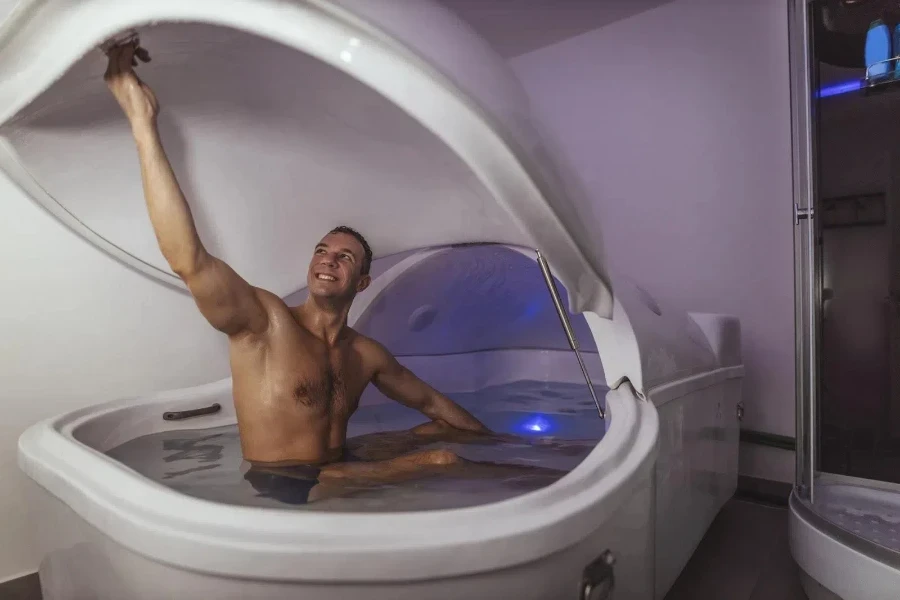
People with mobility issues benefit from hyperbaric oxygen therapy chambers that are big enough to accommodate a wheelchair or have roll-in stretchers. These accessible features are essential for those who struggle to get on and off the resting platform or are at risk of falling, ensuring everyone can safely receive treatment—even if they can’t walk into the chamber or position themselves easily.
The bottom line
Although HBOT is a super effective treatment, retailers must understand the potential risks before selling hyperbaric oxygen chambers. Technical risks include too much-administered gas, fire/explosion risks, and improper sealing. In addition, biological risks may include barotrauma and hyperoxia.
Once businesses understand these risks and ensure their target consumers get the necessary information and can properly use the machine at home, they can sell these fantastic oxygen therapy devices. And finally, remember to subscribe to Alibaba Read’s sports section for more insightful topics like this.
